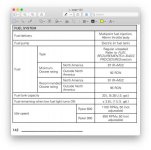BajaRon
Well-known member
I have to disagree. Thats a marketing piece, not a recommendation. The operators manual says to use 87 octane.
That is not just a marketing piece. The marketing people go to the engineers when they are making a spec. sheet. That page is giving just the optimum fuel octane recommendation without the additional information contained in the owner's manual which also lists minimum octane requirements.
I don't mean to be argumentative. However, I am going to post just once more in the hope that others are looking for a final, fact based answer to this discussion.
When you say that 'The operators manual says to use 87 octane', (found on page 37 as your original post accurately references). Admittedly, the statement could have been better worded to make their intention more clear. But the meaning here is NOT that you SHOULD use 87 octane fuel. Instead, it is giving 87 octane fuel as the lower limit which MAY safely be used in the Ryker. Put another way. You should NOT use fuel with an octane rating below 87.
The manual then goes on to clearly indicate 91 as the optimal fuel octane for which this engine was designed to operate most efficiently. Be careful not to read the heading 'Recommended Fuel' into the following paragraph. It is simply designating that the following information gives both the minimum and optimal fuel parameters. The owner can then make a decision as to which way they want to go with their Ryker.
Here is the entire text of what is given on Page 37 of the BRP, Can-Am Ryker owner's manual
Recommended Fuel
Use regular unleaded gasoline with a
minimum AKI (RON+MON)/2 octane
rating of 87, or an RON octane rating of
92.
For optimal performance, use premium unleaded gasoline with an AKI
(RON+MON)/2 octane rating of 91, or
an RON octane rating of 95.
I think the manufacturer assumes most will want to operate their vehicle with optimal recommendations. Yet they understand that some may want to go with minimum requirements or not have higher octane fuels available to them. For these owners, BRP wisely gave a lower parameter (87 octane) which should not be exceeded.
Last edited:

